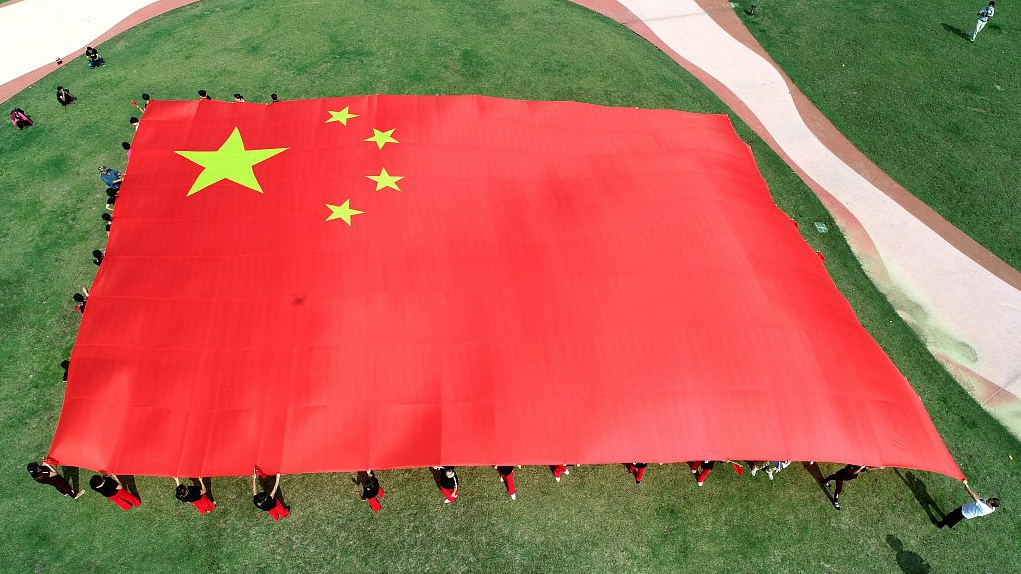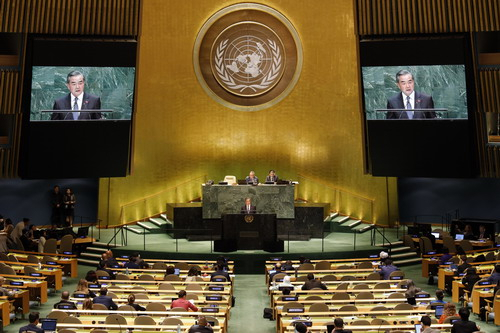
Editor's note: Xu Qinduo is China Radio International's former chief correspondent to Washington and a senior fellow of the Pangoal Institution. The article first appeared on the website China Plus on March 25. It reflects the author's views, and not necessarily those of CGTN.
Malaysian Prime Minister says it well: "We have had a relationship with China for 2,000 years. They never conquered us. Europeans came. Two years later, they conquered us."
The remarks of the 93-year-old statesman point to the nature of Chinese foreign policy. As said by Wang Yi, the Chinese Foreign Minister and State Councilor, at the United Nations General Assembly, "China will never pursue hegemony or seek expansion."
A case in point has been Admiral Zheng He's great voyages in early 15th century. On behalf of the Chinese emperor at that time, Zheng led seven voyages, traveling through the South China Sea, Indian Ocean and reaching as far as the east coast of Africa.
Unlike the colonizers who took overseas adventures later and started colonizing, Zheng He brought with him goods for trade and gifts for goodwill. Zheng He's story, therefore, speaks to what kind of power China is.
Despite the strong track record, China is still confronted with some challenges. Beijing, thus, needs to be pragmatic in terms of the Taiwan issue and well-prepared for the worst scenario in which the United States may intervene militarily.
Another key message from Wang is that China doesn't impose its political will on other countries. "We have no intention to export our development model or to lecture others."
Some international experts have summed up China's development experiences, including infrastructure construction, as the "China Model," as against the Washington Consensus, which refers to a set of free market economic ideas.
If there's a China Model, which never surfaces in any official documents, the key message would likely be that any country may borrow some of the development experiences from other countries, but ultimately the one is supposed to discover its own path of development.
Besides, another reason for China not seeking to export its model lies in its diplomatic principle of non-interference of internal affairs.
As Wang Yi said, "China stands for equality among all countries irrespective of their size. China respects the sovereignty and territorial integrity of other countries, and the social system and development path independently chosen by the people of these countries."
So what type of power will China be?

Chinese State Councilor and Foreign Minister Wang Yi addresses the 74th session of the United Nations General Assembly in New York, September 27, 2019. /Photo via fmprc.gov.cn
Chinese State Councilor and Foreign Minister Wang Yi addresses the 74th session of the United Nations General Assembly in New York, September 27, 2019. /Photo via fmprc.gov.cn
Obviously, China will not become America, which has military bases in 80 countries. Nor does it have any desire to replace the U.S. to dominate global affairs.
The U.S., during the past years, practices the "America First" principle and has withdrawn from the Trans-Pacific Partnership, the Paris Agreement for climate change, the UN Human Rights Council, the Iranian nuclear deal and so on.
By contrast, China has been an active participant in the fight against climate change, investing the most in clean energy in the world. For example, China is now the world's largest producer, exporter and installer of solar panels, wind turbines, batteries and electric vehicles.
On peace and stability, China is the second largest contributor to both the United Nations and the UN peacekeeping operations. Beijing also dispatched the largest number of peacekeeping personnel among the big five of the UN Security Council.
As a leading advocate of globalization and free trade, China – probably the only country in the world – encourages import of goods and services from the rest of the world by hosting a yearly International Import Expo.
If there's one word to characterize the China power, it must be "development," which has been the key theme for China over the past decades and is expected to remain so for a long time.
The grand Belt and Road Initiative, which is proposed by China and involves infrastructure connectivity to facilitate trade and investment, boils down to a global development strategy.
To sum up, as Wang noted, "peaceful development, which has long been incorporated in China's Constitution, is the cornerstone of China's foreign policy."
(If you want to contribute and have specific expertise, please contact us at opinions@cgtn.com.)